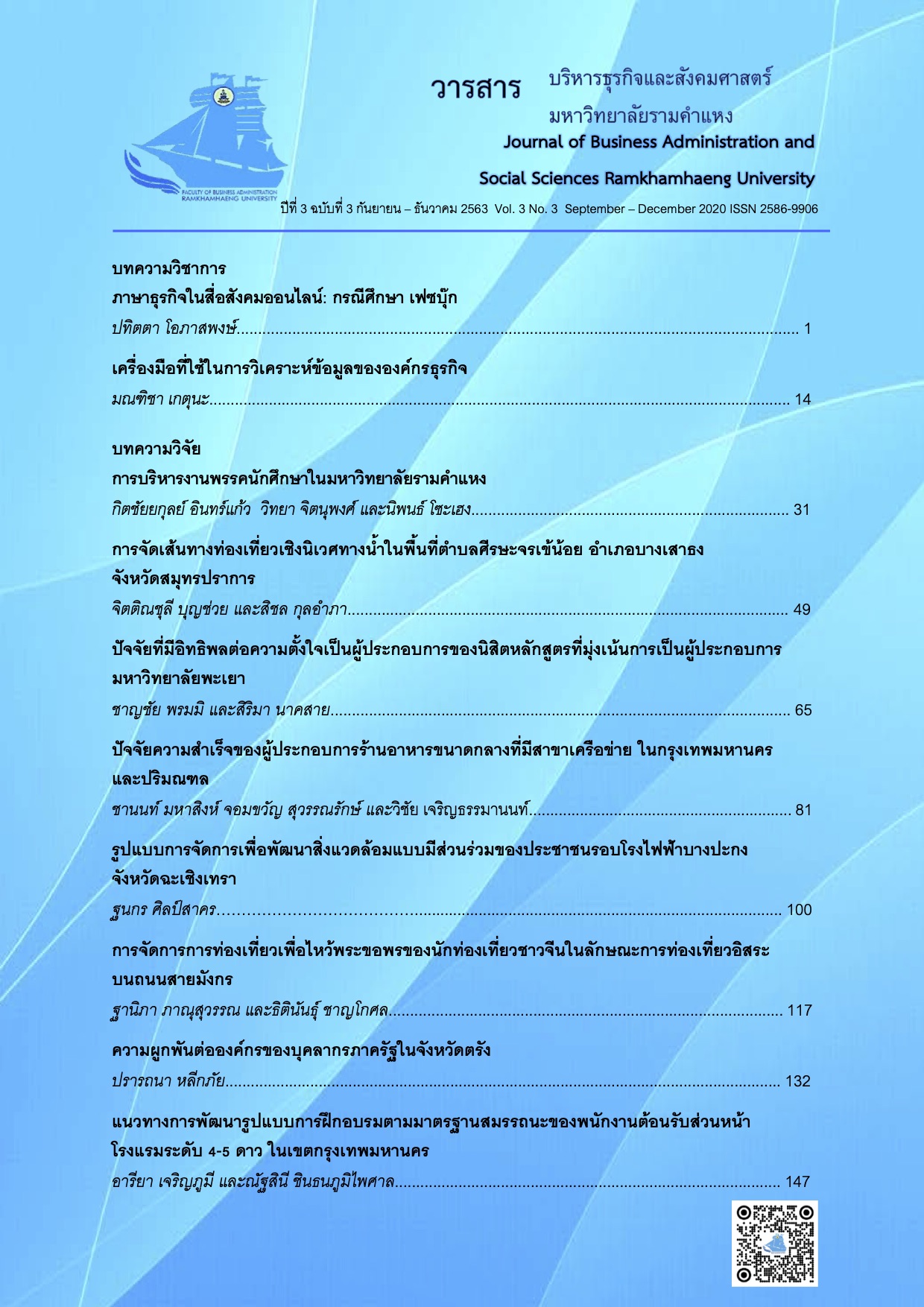The Management of Student Parties in Ramkhamhaeng University
Main Article Content
Abstract
In this research investigation, the researchers examine 1) the formation of student parties and their election systems at Ramkhamhaeng University (RU); and analyze 2) the management of these parties during the period from 1992 to 2019. The qualitative research was employed using participatory observation and in-depth interviews with those concerned with student parties.
Findings are as follows:
1. The formation of student parties at RU during the period from 1992 to 2019 could be divided into two characteristics. 1) In practice, it was the aggregation of students with common ideologies and opinions or having conflicts within old parties or between parties. 2) In principle, it was in accordance with the intent and regulations of RU to encourage students to participate in activities to learn democracy. The rules or regulations were then enacted to form student parties. The election systems of student parties could be divided into two characteristics: the majority system and the proportional system.
2. The management of student parties focused on the participation of both ordinary and extraordinary members of all parties. A meeting was called an “assembly” which was “intense”, leading to the crystallization of thought to be a party’s resolution. This was used in the determination of policies and the mobilization of the party’s activities. Their seniors were their mentors and coordinated with agencies inside and outside the university.
Article Details
เนื้อหาและข้อมูลในบทความที่ลงตีพิมพ์ในวารสารบริหารธุรกิจและสังคมศาสตร์ มหาวิทยาลัยรามคำแหง ถือเป็นข้อคิดเห็นและความรับผิดชอบของผู้เขียนบทความโดยตรง ซึ่งกองบรรณาธิการไม่จำเป็นต้องเห็นด้วย หรือร่วมรับผิดชอบใดๆ
บทความ ข้อมูล เนื้อหา รูปภาพ ฯลฯ ที่ได้รับการตีพิมพ์ในวารสารบริหารธุรกิจและสังคมศาสตร์ มหาวิทยาลัยรามคำแหง ถือเป็นลิขสิทธิ์ของวารสารบริหารธุรกิจและสังคมศาสตร์ มหาวิทยาลัยรามคำแหง หากบุคคลหรือหน่วยงานใดต้องการนำบทความทั้งหมดหรือส่วนหนึ่งส่วนใดไปเผยแพร่ต่อ หรือเพื่อกระทำการใดๆ จะต้องได้รับอนุญาตเป็นลายลักษณ์อักษรจากวารสารบริหารธุรกิจและสังคมศาสตร์ มหาวิทยาลัยรามคำแหง ก่อนเท่านั้น
References
กรกมล เรืองเดช. (2554). การมีส่วนร่วมทางการเมืองของนักศึกษาไทย: ศึกษาเปรียบเทียบกิจกรรมเพื่อพัฒนาประชาธิปไตยขององค์การนักศึกษามหาวิทยาลัยรามคำแหงและมหาวิทยาลัยธรรมศาสตร์.วิทยานิพนธ์ศิลปศาสตรมหาบัณฑิต (รัฐศาสตร์), มหาวิทยาลัยรามคำแหง.
งามพิศ สัตย์สงวน. (2558). การวิจัยเชิงคุณภาพทางมานุษยวิทยา (พิมพ์ครั้งที่ 7). กรุงเทพมหานคร: สำนักพิมพ์แห่งจุฬาลงกรณ์มหาวิทยาลัย.
จิรโชค วีระสย สุรพล ราชภัณฑารักษ์ และสุรพันธ์ ทับสุวรรณ์. (2559). รัฐศาสตร์ทั่วไป (พิมพ์ครั้งที่ 3). กรุงเทพมหานคร: สำนักพิมพ์มหาวิทยาลัยรามคำแหง.
ชูชีพ ประทุมเวียง. (2547).องค์การนักศึกษากับการพัฒนาพฤติกรรมประชาธิปไตย. วารสารมนุย์สังคมวิชาการ, 2, 89-100.
ปรีชา หงส์ไกรเลิศ. (2524). พรรคการเมืองและปัญหาพรรคการเมืองไทย. กรุงเทพมหานคร:สำนักพิมพ์ไทยวัฒนาพานิช.
รวีวรรณ ชินะตระกูล. (2544). การวิจัยเชิงคุณภาพ. กรุงเทพมหานคร: มิตรภาพการพิมพ์และสตูดิโอ.
รังสรรค์ แสงสุข. (2514). องค์การนักศึกษามหาวิทยารามคำแหง. ข่าวรามคำแหง, 1(6), 3.
วิทยา นภาศิริกุลกิจ และสุรพล ราชภัณฑารักษ์. (2561). พรรคการเมืองและกลุ่มผลประโยชน์ (พิมพ์ครั้งที่ 13). กรุงเทพมหานคร: สำนักพิมพ์มหาวิทยาลัยรามคำแหง.
ศิลา โคมฉาย. (2543). เล่าความจริงขบวนการนักศึกษารามคำแหงยุคต้น 2514-2519. กรุงเทพมหานคร: มิ่งมิตร.
สดุดี กุลสิรวิชย์. (2549). ศึกษาบทบาทและปัญหาการจัดกิจกรรมด้านวัฒนธรรมของชมรมนักศึกษา องค์การบริหารองค์การนักศึกษามหาวิทยาลัยสงขลานครินทร์ วิทยาเขตหาดใหญ่. วิทยานิพนธ์ศิลปศาสตรมหาบัณฑิต, มหาวิทยาลัยทักษิณ.
สิรวิชณ์ สาวัน. (2553). บทบาทของนักศึกษามหาวิทยาลัยรามคำแหงต่อการพัฒนาระบอบประชาธิปไตย.วิทยานิพนธ์ศิลปศาสตรมหาบัณฑิต (รัฐศาสตร์), มหาวิทยาลัยรามคำแหง.
สุภางค์ จันทวานิช. (2551). วิธีวิจัยเชิงคุณภาพ (พิมพ์ครั้งที่ 16). กรุงเทพมหานคร: สำนักพิมพ์แห่งจุฬาลงกรณ์มหาวิทยาลัย.
เสกสรรค์ ประเสริฐกุล. (2557). การเมืองภาคประชาชนในระบอบประชาธิปไตยไทย. (พิมพ์ครั้งที่ 4). กรุงเทพมหานคร: วิภาษา.
หยุด แสงอุทัย. (2518). พรรคการเมือง. กรุงเทพมหานคร: พิฆเณศ.
เอกวิทย์ มณีธร. (2552). รัฐศาสตร์. กรุงเทพมหานคร: เอ็ม ที เพรส.
อัครพงษ์ มณีภาค. (2535). การศึกษาบทบาททางการเมืองขององค์การนักศึกษามหาวิทยาลัยรามคำแหง ปี2530-2534. วิทยานิพนธ์รัฐศาสตรมหาบัณฑิต, จุฬาลงกรณ์มหาวิทยาลัย.
Denzin, N. K., & Lincoln, Y. S. (2000). The handbook of qualitative research (2nd ed.). Thousand Oaks, CA: Sage.
Duverger, M. (1964). Political parties: Their organizations and activities in the modern state. London: Methuen.
Lapalombara, J., & Weiner, M. (1966). Political parties and political development. Princeton, NJ: Princeton University Press.
Pennock, J. R., & Smith, D. G. (1964). Political science. New York: Macmillan.
Stake, R. E. (2000). Case student. In N. K. Denzin & Y. S. Lincoln (Eds.), Handbook of qualitative research (2nd ed, pp. 435-453). Thousand Oaks, CA: Sage.


